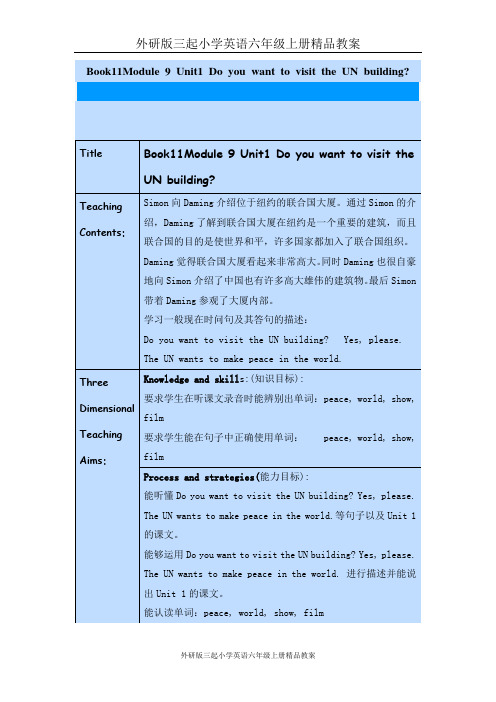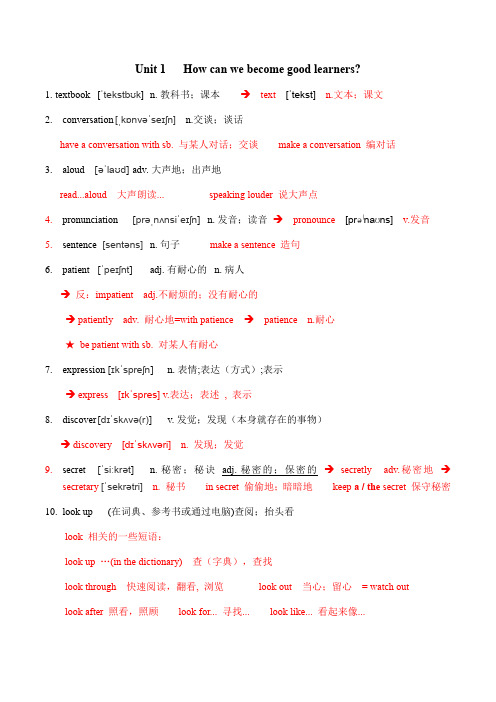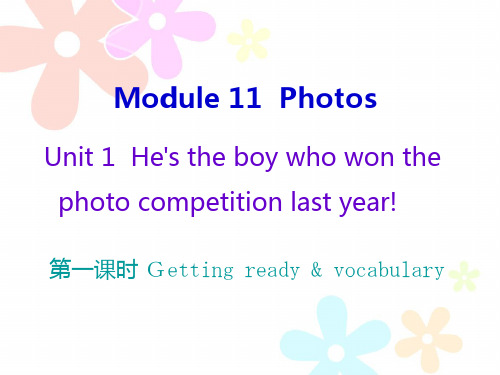book11 unit 1
外研版三起小学英语六年级上册精品教案:9Unit 1 Do you want to visit the UN building_

Teaching steps Step 1 Warm-up (热身活动)a. Greeting.教师与学生互相问好。
b. Sing a song: America,America 播放录音,师生齐唱,大屏幕显示歌词和与歌曲相关的图片。
c. Ask and answer: Doyou like this song? Whatdo you know aboutAmerica?学生根据已有经验和自己课前搜集的资料回答,当学生说出the UNbuilding时,教师引出新课。
Step 2 Presentation(介绍新语言项目)GreetingSing a song学生根据已有经验和自己课前搜集的资料回答,学生边听边结合图片理解课文。
通过唱歌和自由问答环节,调动学生的学习兴趣,营造出学习英语的氛围,同时帮助教师了解学生的知识储备,为学习新知做好准备a. 呈现图片,引出课文 .出示联合国大厦的图片,问: Do you know the UN building?The UN is the United Nations. Do you want to visit the UN building? Today we’ll visit the UN building with Daming and Simon. (板书课题)b. Play the tape and letthe students listen.教师播放录音.Step 3 Practice (练习) a. 操练“want to”句子1.Listen again and find the sentences with “want to”.教师再次播放学生边听边找出含有“want to”的句子,划出来。
学生读自己找到的句子(共3句),学生回答Yes, please.学生还可以怎样回答,学生会答Yes,I do.S1: Yes, please.或者回答Yes,I do.S2: Yes, please.这名同学做跟刚才第一个同学相同的事。
新外延版九年级英语上册module11unit1

Words: general standard feeling difficulty subject add recently menu Phrases: be in with a chance the general standard of… Patterns: He’s the boy who won the photo competition last year! The one who took photos at the school dance?
英语连读的规则: 1. “辅音+元音”型(即相邻两词中的前 一个词是以辅音结尾,后一个词以元 音开头) eg: Please pick it up. Not at all. 2. “辅音+半元音”型(即前一个词以元 音开头,后一个词以/j/,/w/开头) eg: Thank you. Did you get there late again?
—Therecoring a point. — Is it in Module 8?
总结回顾
本课时主要短语和句型 1. be in with a chance 2. solve the difficulty 3. The thing is 4. You bet! 5. He’s the boy who won the photo competition last year! 6. — There is a basketball player who’s scoring point. — Is it in Module 8?
…
It might be a concert.
P88 2 Listen and complete the sentences.
1. The boy ______________ on the right is the guitar player. 2. The boy _______________ is the in the centre singer. 3. The boy _______________ at the back is the drummer.
9Unit 1 Do you want to visit the UN building_

Teaching steps Step 1 Warm-up (热身活动)a. Greeting.教师与学生互相问好。
b. Sing a song: America,America 播放录音,师生齐唱,大屏幕显示歌词和与歌曲相关的图片。
c. Ask and answer: Doyou like this song? Whatdo you know aboutAmerica?学生根据已有经验和自己课前搜集的资料回答,当学生说出the UNbuilding时,教师引出新课。
Step 2 Presentation(介绍新语言项目)a. 呈现图片,引出课文 .GreetingSing a song学生根据已有经验和自己课前搜集的资料回答,学生边听边结合图片理解课文。
通过唱歌和自由问答环节,调动学生的学习兴趣,营造出学习英语的氛围,同时帮助教师了解学生的知识储备,为学习新知做好准备出示联合国大厦的图片,问: Do you know the UN building?The UN is the United Nations. Do you want to visit the UN building? Today we’ll visit the UN building with Daming and Simon. (板书课题)b. Play the tape and letthe students listen.教师播放录音.Step 3 Practice (练习) a. 操练“want to”句子1.Listen again and find the sentences with “want to”.教师再次播放录音.2. Read the sentences 学生边听边找出含有“want to”的句子,划出来。
学生读自己找到的句子(共3句),学生回答Yes, please.学生还可以怎样回答,学生会答Yes,I do.S1: Yes, please.或者回答Yes,I do.S2: Yes, please.这名同学做跟刚才第一个同学相同的事。
Unit1单词及词性转换知识点汇总人教版英语九年级全册

Unit 1 How can we become good learners?1.textbook [ˈtekstbʊk]n.教科书;课本→text [ˈtekst]n.文本;课文2.conversation[ˌkɒnvəˈseɪʃn] n.交谈;谈话have a conversation with sb. 与某人对话;交谈make a conversation 编对话3.aloud [əˈlaʊd]adv.大声地;出声地read...aloud 大声朗读...speaking louder 说大声点4.pronunciation [prəˌnʌnsiˈeɪʃn]n.发音;读音→pronounce [prəˈnaʊns]v.发音5.sentence[sentəns]n.句子make a sentence 造句6.patient[ˈpeɪʃnt]adj.有耐心的n.病人→反:impatient adj.不耐烦的;没有耐心的→ patiently adv. 耐心地=with patience →patience n.耐心★be patient with sb. 对某人有耐心7.expression [ɪkˈspreʃn]n.表情;表达(方式);表示→ express [ɪkˈspres] v.表达;表述, 表示8.discover[dɪˈskʌvə(r)]v.发觉;发现(本身就存在的事物)→discovery [dɪˈskʌvəri] n. 发现;发觉9.secret[ˈsiːkrət]n.秘密;秘诀adj.秘密的;保密的→secretly adv.秘密地→secretary [ˈsekrətri] n. 秘书in secret 偷偷地;暗暗地keep a / the secret 保守秘密10.look up (在词典、参考书或通过电脑)查阅;抬头看look 相关的一些短语:look up …(in the dictionary) 查(字典),查找look through 快速阅读,翻看, 浏览look out 当心;留心= watch outlook after 照看,照顾look for... 寻找... look like... 看起来像...look at... 看... take / have a look (at…) 看一看...look forward to (doing) sth. 期待(做)某事look back on/at 回顾,回忆,回首(往事)11.grammar[ˈɡræmə(r)]n.语法12.repeat[rɪˈpiːt]v.重复;重做13.note [nəʊt]n.笔记;记录v.注意;指出→ notebook n. 笔记本make notes = take notes 记笔记14.pal[pæl]n.朋友;伙伴 a pen pal 笔友15.physics[ˈfɪzɪks]n.物理;物理学→ physical [ˈfɪzɪkl]adj. 身体的;物理学的16.chemistry [ˈkemɪstri] n.化学→chemical [ˈkemɪkl]adj.化学的→ chemist [ˈkemɪst]n. 化学家,药剂师17. memorize ['meməraiz] v. 记忆;记住→memory [ˈmeməri]n.记忆复数: memories18.pattern[ˈpætn]n.模式;方式19.pronounce[prəˈnaʊns] v.发音→ pronunciation[prəˌnʌnsiˈeɪʃn]n.发音;读音20.increase[ɪnˈkriːs]v.增加;增长→反: decrease v. 减少;降低/ reduce v. 减少;缩小★increase by…增加了…increase to….增加到….21.speed[spi:d]n.速度v.加速(speed-sped-sped)speed up 加速at speed 高速,快地at a speed of ... 以....速度22.partner[pa:(r)tnə(r)]n.搭档;同伴→ part n.部分;角色;地区v.分开23.born [ bɔ:n] v.出生adj. 天生的→ birth n.出生give birth to...生育...at birth 在出生时= when sb./sth. was born → birthday n.生日be born in + 年/月be born on + 日期be born with…天生具有…be born + adj. He was born blind.24.be born with 天生具有25.ability[ə’biləti]n.能力;才能★have the ability to do sth. 有做某事的能力→ able adj. 有能力的,能够的→反:unable → disabled adj. 肢体残疾的be able to do sth. 有能力做某事→反:be unable(=not able)to do sth.26.create [kriˈeɪt] v.创造;创建→creation [kriˈeɪʃn]n..创造→ creator n.创造者→ creative [kriˈeɪtɪv] adj.有创造力的→ creativity [ˌkri: eɪˈtɪvəti] n.创造力,创造性27.brain[breɪn]n.大脑brain storm 头脑风暴28.active[ˈæktɪv]adj.活跃的;积极的→ act n. & v. 行为;举动→ actor/actress n.男演员/女演员→ action n. 行动;行为→ activity n. 活动(复数): activities29.attention [əˈtenʃn]n.注意;关注30.pay attention to(to是介词)注意;关注31.connect [kəˈnekt]v.(使)连接;与⋯⋯有联系→ connection n.连接;联系32.connect … with... 把...和...连接或联系起来33.overnight[ˌəʊvəˈnaɪt]adv.一夜之间;在夜间→ night n. 夜;黑夜at night/ in the night在夜里→ tonight adv.在今夜;在今晚→ midnight n. 半夜at midnight 在半夜until midnight 直到半夜34.review[rɪˈvjuː] v. & n.回顾;复习= go over →反:preview v.&n. 预习;预览→view n.看法,意见;视野v. 看待;查看→ interview n.&v. 面试;采访35.knowledge[ˈnɒlɪdʒ][U.]知识;学问→ knowledgeable [ˈnɒlɪdʒəbl] adj. 有知识的;知识渊博的36.lifelong adj.终身的;毕生的37.wisely adv. 明智地;聪明地→ wise adj.明智的→ wisdom n.智慧。
外研版九年级英语上册课件:Module 11 Unit 1 (共32张PPT)

拓展 与add相关的短语
举例 The wonderful view added to our pleasure.
美丽的景色增加了我们的乐趣。 Please add a note to the poster. 请在海报
上加个说明。 The bills add up to exactly $100. 这些账单
2 feeling的用法;difficulty的用法 教材例句
I have a feeling that we can solve these little difficБайду номын сангаасlties. 我感觉我们能解决这些小困 难。(教材第88页)
用法1 feeling作名词,意为“感觉;感情”。其动词形式为 feel。
I think you are __i_n__ __w_i_t_h__ __a__ __c_h_a_n_c_e__ of
winning the prize.
常用句型精讲
1 that引导的同位语从句的用法 教材例句 I have a feeling that we can solve these little difficulties. 我感觉我们能解决这些 小困难。(教材第88页)
13、He who seize the right moment, is the right man.谁把握机遇,谁就心想事成。2021/9/52021/9/52021/9/52021/9/59/5/2021 •14、谁要是自己还没有发展培养和教育好,他就不能发展培养和教育别人。2021年9月5日星期日2021/9/52021/9/52021/9/5 •15、一年之计,莫如树谷;十年之计,莫如树木;终身之计,莫如树人。2021年9月2021/9/52021/9/52021/9/59/5/2021 •16、教学的目的是培养学生自己学习,自己研究,用自己的头脑来想,用自己的眼睛看,用自己的手来做这种精神。2021/9/52021/9/5September 5, 2021 •17、儿童是中心,教育的措施便围绕他们而组织起来。2021/9/52021/9/52021/9/52021/9/5
EIMBook1Unit11Promise,promise单元知识要点

EIMBook1Unit11Promise,promise单元知识要点Unit 11 Promise, promisePart 1 (p82-83)New Wordcelebrate [?sel?bre?t] v. 庆祝promise [?pr?m?s] v./ n. 许诺,允诺eve[i?v] n. 前夕intention [?n?ten?n] n. 意向,意图midnight [?m?dna?t] n. 子夜,午夜sparkling [?spɑ:kl??] adj. 闪烁的,闪闪发光的crystal [?kr?stl] n. 结晶,晶体,水晶appear [??p??(r)] v. 出现roof [ru?f] n. 屋顶,顶部second [?sek?nd] n. 秒;num. 第二ground [gra?nd] n. 地面billion [?b?lj?n] n./num. 十亿break [bre?k] v. 打破,折断,弄坏resolution [?rez??lu:?n] n. 决心strike [stra?k] v. 攻击,罢工,敲响报时(struck-struck)effort[?ef?t] n. 努力familiar [f??m?li?(r)] adj. 熟悉的business [?b?zn?s] n. 商业drop [dr?p] v. 落下,掉下chips [t??ps] n. (bre) 炸薯条gym [d??m] n. 体育馆,健身房cheer [t(r)] v. 欢呼,使高兴angrily [gr?li] adv. 愤怒地To be understoodTimes Square 时代广场New York 纽约increase [?n?kri?s , kri?s] v. 增加,增长decrease [d??kri?s , ?di?kri?s] v. 减少bomb [b?m] n. 炸弹Word Form1.celebrate [?sel?bre?t] v. 庆祝---celebration n. 庆祝,庆祝活动---celebrate [?sel?bre?t] v. 庆祝---celebrated adj. 闻名的---celebrity [s??lebr?ti] n. 名人2.intention [?n?ten?n] n. 意向,意图---intend [?n?tend] v. 计划,意欲3.appear [??p??(r)] v. 出现---appearance [??p??r?ns] n. 外貌,出现---disappear [?d?s??p??(r)] v. 消失4.cheer [t(r)] v. 欢呼,使高兴---cheerful [?tfl] adj. 令人愉快的,欢乐的,高兴的5.angrily [gr?li] adv. 愤怒地---angry [ɡri] adj. 愤怒的,生气的Phrases and Sentences1.New Year’s Eve 除夕2.promise v./ n. 许诺,允诺3.The government has promised a full investigation(调查) into the disaster.make/keep/break a promise 做出/遵守/违背承诺4.make/keep/break resolutions 制定/遵守/打破新年计划5.before/at midnight 午夜前/在午夜的时候6.on the roof of 在...的顶部7.world, come together to say ‘good bye’ to the old year and ‘hello’ to the new.8.not…any more= no more 不再9.In the US, New Year is also a time for thinking about(考虑) the changes you are going to make in your life.10.The ball takes sixty seconds to drop to the ground. Then the clock strikes twelve and everyone cheers.11.have ... in common 在某方面有共同点[have something /a little /a lot in common]The two cultures have a lot in common.Many New Year’s resolutions have one thing in common: people break them before the New Year is very old.12.for one thing 首先,一方面13.take up 开始从事,占用,接受14.make an effort to do sth. 努力做某事We all make an effort to finish the project on time.15.check out that new gym 看看那个新开的健身房什么样16.be familiar to sb. 为....所熟悉The smell is very familiar to everyone who lives near a bakery.17.be familiar with sth. 熟悉,知晓,精通某事Are you familiar with the computer software they use?18.I really mean it. 我是认真的19.You can tell me off(训斥) if I don’t keep them this time.20.drop to 下降到…; drop by 下降了21.work out 解决22.give up doing sth. 放弃做某事23.look up 查找24.intend (not) to do sth. 打算(不)做某事=have an/ no intention to do sth. 打算(不)做某事25.get across= cross 横过26.modern art 现代艺术27.grow up 长大(无被动)28.bring up 抚养,养育(有被动)29.set up a business = start a business创业30.Grammar:进行时表计划、打算和预测。
视听说教程例文unit1book1
Unit 1 book 1 1. 听力原文 ( Active Listening andSpeaking 1) Hi, I 'm Donna Bones, life and relationship coach here in New York City, and the author of It 'Asll About You. In this program, we' ltlalk about how to make a good first impression in college. And the first thing is really just the basics. Make sure that you dress nice. You know, just because you can doesn 'mt ean you should wear sweat pants, and be really casual when you go to class. Be on time. Being on time just shows respect and it 's a good habit to get into for your whole life. If you can sit near the front where you can participate and ask questions, then that 'a sgood way to make a good impression. And, really study. I know it tempting ,but you are in college to learn. So, if you can, really make your studies a priorityand do that first. So the best way to make a good impression is to make school your top priority, dress nice, ask questions in class, show up on time, and really dedicate yourself to learning. I promise you as you get older and go through life, yes, you ' ll lookat the great times you had in college. But the most important thing is the education that you got at college.And as far as to the other students, if you want to make a good impression, maybe, you know, go join a fraternity or sorority or something. And join a club, orsomething else to get you involved with other people, because then you can get to meet other people and make new friends. So I think, as long as you 're true to yourself, andconfident in yourself, and proud of yourself, you' ll always make a good first impression no matter where you go. 2.words bank Some examples for yourreference: Words Sentences I had no idea what Sunday lunch meant in French terms, whether it was casual formal or casual. priority His first prioritywas to find someone who could aid him in his search. Divide up what you have to learn into manageable parts and then dedicate dedicate one day to one part. People should note that health funds are not morally acceptable as they involve may include companies involved in animal testing. There were times when I ' d done both those things, but still wasn't very confident confident. participate The athlete refused to participate in the games for political reasons.3.how to start a conversation Expression for starting a conversation at a Party or Club: —What anamazing party! Hi, my name ' s Mark. Expression for starting a conversation in a Public Place: —Hi, my name's Penny. I 'todshoaffkeer yourhand, but I broke my arm while rock climbing last weekend.Expression for starting a conversation at a Music Venue: —What do you think of the concert?prehensive Sydney White (2007) Clip OneDad:Sydney! Time to get a move on, sweetheart! Wow. You know, if Mom was here, she ' dknow exactly what to say. She'd be so excited you're going to her school, gonna join her sorority. Sydney: I ' mnot in yet, Dad. Dad:Girl, you 're gonna fit into that place like a... overflow tube in a pressure tank. Sydney C: ome on, Dad. We said no mushy stuff. Dad:Right. No mushy stuff. Come here.Sydney: I love you, Dad. Mom:Dear Sydney, I love you so much. I ' mso sorry I 'm not there to see you off to college. But since I can 'bte,I've put some of my favorit e memories in this box. Live every moment, Sydney. Grab every opportunity. And have fun in everything you do. The friends you meet in college will be your friends for life. Perhaps you ' flilll this box withyour own memories to pass on to your daughter someday. And know that though I can't be there with you now, I'm always right by your side every step of the way.Clip TwoProfessor: We live in a country that ' s considered to be the ultimate model ofgovernment. By the people, for the people, and of the people. But most Americans would besurprised to find how afraid the FoundingFathers were of what a direct democracy could do to the country. Can anyone tell me why? The young man snoring there, perhaps? Student 1:The Founding Fathers were afraid that direct democracy would do to America what it did to Rome. Alexander Hamilton even advocated a monarchy. (snores) Professor: Exactly. We are trained to think the more power the people have, the better. Can any of you tell me some reasons why this isn 'ntecessarily true? Ah, Terrence. Still here after eight years. What do you say we give someone else a chance to respond this time, huh? Um... Ms. Witcburn? Ms. Witchburn: Most Americans don 't educate themselves about the issues. There are some valid arguments for keeping things a little bitmore... elite. You could even argue a case for certain types of oligarchy. Professor: Interesting. Let's hear from someone else. How about... you? Ms? Sydney: White. Professor: Ms. White. Any thoughts? Sydney :Um... I guess I think that's... underestimating the masses a bit. Not to mention overestimating the elites . Apartheid was an oligarchy, and noone wants that again. Professor: Excellent. 5.词 汇 1. 适应大学 fit into the college 2. 不要伤感。
Unit 1 知识点读背清单- 高中英语人教版(2019)选择性必修第三册
新人教版高中英语XB3 U1 知识点读背Part I. 词形转换1.precise adj.准确的;精确的--precisely adv.2.realistic adj.现实的;逼真的--realism n.逼真;现实主义;务实作风--reality n.现实3.art n. 艺术;美术--artistic adj. 艺术的;艺术家的;有艺术性的--artist n. 艺术家;美术家4.humanistic adj. 人文主义的--humanity n.[U]人性;人道;(统称)人类5. influence vt./n.影响--influential adj.有很大影响力的;有支配力的6.civil adj.国民的;民用的;民事的--civilize vt.教化;使...文明;使...有教养--civilization n.文明;社会文明; --civilized adj.文明的;开化的;有教养的;有道德的7.recognise vt. 认出,辨认; 承认,意识到--recognition n.承认;认出;赞誉8.expand vt. 扩张;扩展;扩大--expansion n.9.invest v.投资;投入(时间,精力等)--investment n.投资额;投资;(时间、精力的)投入10. exhibit vt.展览n.展览品--exhibition n.展览11.enter vt. 进入(直接跟宾语,不要into);报名参加--entry n. 进入(指权利等);参与,参赛--entrance n.入口;大门口12.visual adj. 视力的;视觉的--vision n.视力;视野;想象;幻像13.memory n.记忆,记忆力;回忆---memorial n.纪念碑(或像等);纪念物;纪念品adj.纪念的;悼念的---memorize vt. 记忆;回忆14.represent vt.代表;象征---- representative adj.典型的;有代表性的n.代表15.produce vt.产生(农产品,工业品,艺术品);引起;培养(人才);掏出,抽出n.农产品--production n.生产;产生a sharp / dramatic decline 急剧下降in decline, 在衰退中,在下降中decline to do sth 婉言拒绝做...give a precise definition给出明确的定义religious themes宗教主题in particular = particularly尤其be particular about/over sth. 对……讲究/ 挑剔set … apart from使……区别于/ 不同于adopt a more humanistic attitude to/towards life对生活采取一种更为人性化的态度people of high rank 地位显赫的人important historical events重大历史事件a detailed record of一种对……的具体记录their inner warmth他们内在的温暖a realistic but dream-like quality一种写实却又梦幻般的品质turn to sth.转向某事have an influence / impact / effect on 对……有影响gain/earn/win sb. a good reputation为某人赢得好名声set off 出发;动身;使爆炸;引起set aside 匀出,留出(时间,金钱等);忽视,不顾(ignore)set about 着手;开始(后跟doing sth.)set out出发;着手/开始干...(后跟to do sth.)set down 写下;记下set up建立(found/ establish);(put up)bring ... back to life 使活泼,使生动,使苏醒come to life 苏醒,活跃起来;开始come back to life 苏醒过来;复活seek to do sth.力求做某事1.While painters as early as Da Vinci had used oil, this technique reached its height with Rembrandt (1606 — 1669) , who gained a reputation as a master of shadow and light.尽管早在达芬奇时代一些画家就是用油彩绘画,但伦勃朗(1606年-1669年)使得这种技艺达到顶峰,他拥有“光影大师”的雅称。
Book11 重点单词、短语、句子
Book11 1-8单元重点单词、短语、句子(Unit 1):1.反义词heavy—light strong—weak fast—slow fall asleep—wake up tall—short fat—thin large—small long—short2、表示度量衡单位及时间的词汇的缩写形式:m=metre(s) 公尺(米)cm=centimeter(s) 公分(厘米)km=kilometer(s)千米(公里)kg=kilogram(s) 千克sec=second(s) 秒m=minute(s) 分钟hr=hour(s) 小时3、短语fall asleep 睡着了healthy body 健康的身体fitness test 体能测试grow fast 长得快in the race 在比赛中do pull-ups 做引体向上lift heavy weight 举起重的哑铃lots of 许多,大量have a race 有一场比赛have a rest 休息一下wake up 醒来many different kinds of , too much be bad for get to the finish line 到达终点线winner4、句型:(1). This year, I’m taller and heavier.(2) I’m taller than Kim now.(3) Congratulations to everyone.注:名词congratulation表示祝贺,恭喜,常用算数形式。
如果要表示祝贺的具体内容,习惯上接on 引导的介词短语。
例如:Congratulations to you on your success. 恭喜你成功。
(4) You should also eat a lot of vegetables and fruit.注:vegetable 是可数名词,fruit 是不可数名词。
Book 11 Module 4 Unit 1(1)Can you tell me more about American Festival
Listen and choose. True False
1.Thanksgiving is Daming’s favourite
festivals. 2.Thanksgiving is in December. 3.On Thanksgiving ,people get together. 4.People always have a special meal on
together 一起
together
/
θ
/
this that these those there the
three thirteen thirty thirsty thin thank
What can you find?
ear, pear, hear, bear, nearly
几乎,接近,差不多
country country countries
结尾字母y前面是
元音字母时,直接
加s
monkeys monkey boy boys toy toys
Questions:
What
is Simon’s favourite festival? is it?
When
What
happens on Thanksgiving?
发生
Daming:Can you tell me about American
festivals?
Simon: Yes. My favourite is Thanksgiving. Daming: When is it? Simon: It’s in November.
- 1、下载文档前请自行甄别文档内容的完整性,平台不提供额外的编辑、内容补充、找答案等附加服务。
- 2、"仅部分预览"的文档,不可在线预览部分如存在完整性等问题,可反馈申请退款(可完整预览的文档不适用该条件!)。
- 3、如文档侵犯您的权益,请联系客服反馈,我们会尽快为您处理(人工客服工作时间:9:00-18:30)。
Step1 Lead-in Step2 Revision Step3 Presentation Step4 Practice
Step5 Summary
Step6 Homework
Answer the following questions according to the speech:
Free Talk
Please talk about the following pictures:
1 2
3 3
Last weekend, it was rainy. I stayed at home and played computer games. It was exciting.
Free Talk
Last ____, it was ____. I stayed _____ and _________. It was _____.
I. Key Phrases
ski resort / make a snow man
II. Useful sentences -Where did you go? -What was the weather like? -What did you do? -How was your vacation?
B: I t was cold.
A: What did you do there? B: I went skating there.
Harbin cold / went skating / terrible
A: Did you enjoy yourselves? B: No , I didn’t .It was terrible.
ski mountain beach sail skate
v. n. n. v. v.
滑雪 山 海滩 乘帆船航行 滑冰
vacation
wonderful
n.adj. n.假期精彩的 父亲或母亲
parent
trip
n.
出行,旅行
Li Xiaonian: Hello, Tang Hua! How was your vacation? Tang Hua: Oh, it was wonderful. Li Xiaonian: Where did you go? Tang Hua: I went to Harbin with my parents. We had a great week there. Li Xiaonian: Wow! What was the weather like? Tang Hua: It was cold, but we all enjoyed the beautiful snow. Li Xiaonian: How nice! Did you go to the ski resort there? Tang Hua: Yes, we went there everyday. My parents loved skiing and I enjoyed skating. We also made a very big snowman together!
A: What did you do there? B: I climbed mountains there.
Tai’an cool / climbed mountains / exciting
A: Did you enjoy yourselves? B: Yes, I did.It was exciting.
hot
warm
cold
sunny
rainy
Where did you go last summer vacation?
Harbin It is very cold here , it is in North China.
Where did you go last summer vacation?
你们一家去哪儿了?
你们在那里都玩了什么?
What was the weather like in the speech? Where did she go? What did she do ?
How was her vacation?
Play a guessing game!
feelings
cities
weather
activities
1. Read the dialogue by themselves, then ask two pairs to read it. 2.Act out the dialogue .
Look at the pictures and talk in pairs. Hainan hot / went swimming /wonderful
terrible
How was the vacation?
Question 4: --How was the vacation? --It was …..
interesting
How was the vacation?
Question 5: --How was the vacation? --It was …..
wonderful
Unit 1 I laughed till I cried!
Dialogue
Listen and answer.
1. What was the weather like in that place?
It was very cold. 2. How was their vacation? It was great. 3. Where did he go? He went to Harbin with his parents
What did ...do ?
went swimming picked apples played volleyball on the beach
What did ...do ?
went skating went fishing climbed mountains
What was the weather like?
Please interview five students with the following chart after class.
Name
Zhang Qing
Where
Hainan
Weather
hot
What
went swimming
How
wonderful
Useful expressions: -Where did you go? -What was the weather like? -What did you do? -How was your vacation?
How was your vacation?
你的假期过得怎么样啊?
It was wonderful / great / not bad. 很精彩/很棒/不错。 We had great fun. 我们玩得很开心。
Where did your family go?
What did you do there?
Great
How was the vacation?
Question 2: --How was the vacation? --It was …..
exciting
How was the vacation?
Question 3: --How was the vacation? --It was …..
A: Where did you go?
B: I went to Hainan.
A: What was the weather like?
B: It was hot.
A: What did you do there?
B: I went swimming
A: Did you enjoy yourselves?
Language points:
1. ski resort 滑雪场,滑雪胜地
eg. Mary often went to the ski resort last winter.
2. make a snowman 堆雪人 make 的过去式为made eg. The children made a big snowman in the garden.
A: Did you enjoy yourselves?
B:
Yes , I did. It was great.
Look at the pictures and talk in pairs.
A: Where did you go? B: I went to Harbin. A: What was the weather like?
Look at the pictures and talk in pairs. Kunming warm / went boating / great
A: Where did you go?
B: I went to Kunming.
A: What was the weather like? B: I t was great. A: What did you do there? B: I went boating there.
It is in China ,the people there are very rich.
Where did you go last summer vacation?
Changsha
we study in the city now.
How was the vacation?
Question 1: --How was the vacation? --It was …..
